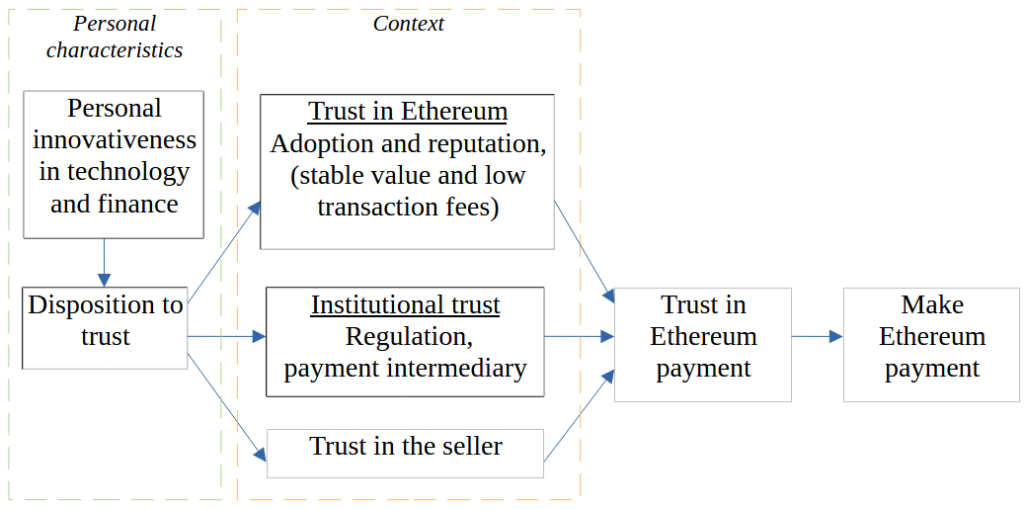Dr Alex Zarifis
My new research developed a model of trust in making payments with the Ethereum (Zarifis, 2023). I published the first peer reviewed research on trust in payments with Bitcoin in 2014 (Zarifis et al. 2014), and I wanted to apply my experience from that to understanding the consumer’s perspective to making Ethereum payments.
Ethereum is being utilised in various ways, including smart contracts and payments. Despite some similarities with Bitcoin, Ethereum is a different technology, with different governance and support.
Ethereum payments require digital wallets and the process is different to paying in traditional fiat currencies like the Euro. When a person wants to take an action without controlling all the parameters, and some risk is unavoidable, trust is necessary.

Figure 1. Model of trust in making Ethereum payments, TRUSTEP
The model demystifies how trust is built in consumer payments with Ethereum. The model starts with the individual’s predisposition and then covers the factors from the specific context of Ethereum payments. From the person’s individual characteristics, their willingness to innovate in finance and technology have a role. There are then five variables from the contexts: Adoption and reputation, stable value and low transaction fees, effective regulation, payment intermediaries and trust in the seller. The personal and contextual factors together influence trust in the Ethereum payment process and making a payment with Ether.
While the model has similarities to previous models of trust, such as the role of each individual’s psychological predisposition and the role of reputation, the role of institutions such as regulators and the importance of trust in the retailer, the distinct characteristics of Ethereum also play a role. In fact, the factors related to the distinct characteristics of Ethereum have the strongest support based on the average of the responses. This research can be added to a growing body of research in trust that illustrates how users’ beliefs in each cryptocurrency need to be explored separately.
Furthermore, the role of the organizations involved in the payment process are shown. While trust in the retailer is usually a factor in retail payments, the regulators and payment intermediaries are not always a significant factor, so it is a useful contribution to show that this is the case here.
That is what I want to share with you here. If you have experiences related to what I am talking about, please let me know, I would love to hear from you.
Reference
Zarifis A. (2023) ‘A Model of Trust in Ethereum Token ‘Ether’ Payments, TRUSTEP’, Businesses, vol.3, no. 4: pp.534-547. https://doi.org/10.3390/businesses3040033 (open access)
Zarifis A., Efthymiou L., Cheng X. & Demetriou S. (2014) ‘Consumer trust in digital currency enabled transactions’, Lecture Notes in Business Information Processing-Springer, vol.183, pp.241-254. http://link.springer.com/chapter/10.1007/978-3-319-11460-6_21#